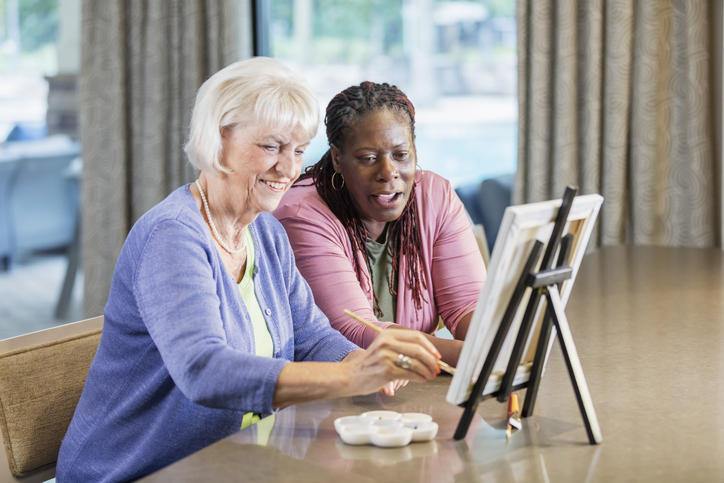
Using DIY sensory activities with seniors who have dementia can help reduce feelings of anxiety and agitation and create a sense of calm.
Rapid mood swings are characteristic signs of dementia, and can be hard for family caregivers to navigate. One moment you may be taking part in an enjoyable activity together, when ostensibly out of thin air, the senior’s countenance shifts. It’s possible to then end up walking on eggshells in an attempt to diffuse a situation you do not completely understand.
Although it’s beneficial to determine the primary cause behind powerful emotions such as fear, anxiety, and agitation, unfortunately, it’s not always feasible. There may be a known cause, like loud noises or sleepiness, that can easily be remedied; but there may be more arbitrary causes, such as the senior recalling an upsetting memory from decades ago they are not able to speak about. To combat these issues, DIY sensory activities can help.
What Should I Do Now?
After confirming that the senior is not in pain or physical distress, there are two crucial actions to take:
- Journaling: Keep a notebook close at hand while taking care of the senior. Write down the date, time, and any other particulars pertaining to an event of agitation. For example, note whether or not the senior had just woken up, had just finished having dinner, hadn’t used the bathroom for several hours, was watching the news on TV, etc. The time of day is especially important to write down, as individuals with dementia frequently suffer from more anxiety in the late afternoon and evening. The goal with journaling is to search for commonalities and patterns that can help you avoid future occurrences.
- Distraction/Redirection: After acknowledging the feelings the senior is having, it’s often beneficial to move into a different part of the home (or to go outside if the weather is nice enough) and change the focus to something enjoyable. If it has been a while since breakfast, a mid-morning snack in the living room might help. If the senior is wandering or pacing, try venturing out for a walk around the block or to the park. At times, listening to favorite music can offer a feeling of relaxation. Try a variety of strategies and document the outcomes in your journal for future reference.
Engaging the Senses
Sensory exercises can help preempt or offer distraction from challenging mood swings. Try creating and implementing some of the following inventive ideas from our experts in Denver elderly home care:
- Perfumed Cards: Cut pieces of cardboard and affix aromatic items in small zip-locked plastic bags to one end. Use various scents that bring to mind memories or a sense of calm: chocolate, cinnamon, peppermint, vanilla, suntan lotion, coffee, etc. Use your imagination and talk about each scent while enjoying them together.
- Aquarium Bag: Fill a sizable zip-locked plastic bag with water beads and a variety of small plastic aquatic animals, plants, etc. Utilize this idea as a jumping-off point to other sensory bags with different themes based on the older adult’s specific interests.
- Homemade Paint: Make up a batch of this safe, nontoxic paint to keep readily available, which can be used for either finger painting or brush painting. Blend together ½ c cornstarch and 2¾ c cold water in a pan. Cook and stir over medium heat until it boils. Stir 1 envelope of unflavored gelatin into ½ c of cold water and add to the cornstarch and water. Allow the mixture to cool, and then divide into different containers, adding different colors of food coloring to each.
Want More Ideas?
At Abby Senior Care, our dementia care specialists are full of innovative ideas such as these, along with the skill to help successfully manage even the most challenging signs of the disease. Our goal is always to make life the very best it can be for the seniors and families we serve, every day. Contact us at 303-699-8840 to find out more about our Denver elderly home care services and our senior care throughout the surrounding communities.
